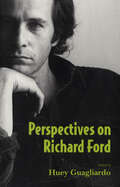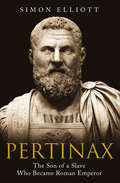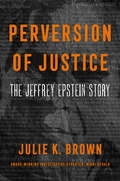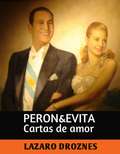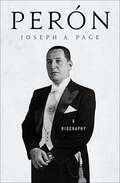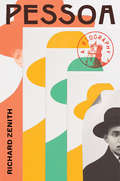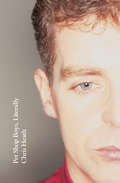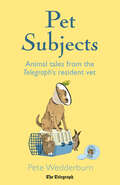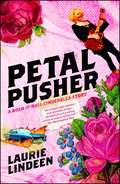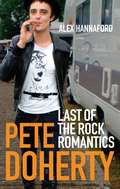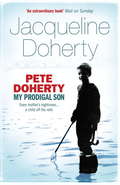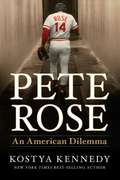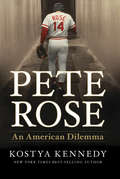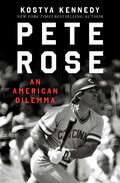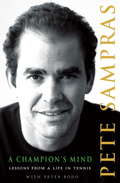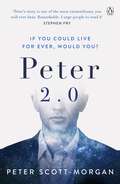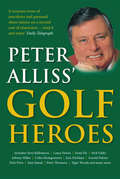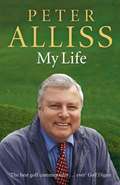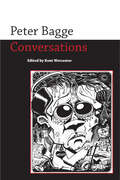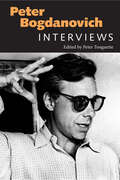- Table View
- List View
Perspectives on Richard Ford
by Huey GuagliardoThis is the first book-length examination of the fiction written by Richard Ford, who gained critical acclaim for The Sportswriter, the story of suburbanite Frank Bascombe's struggle to survive loneliness and great loss. That novel, published in 1986, struck a chord with readers and reviewers alike, and Ford, a little-known writer who had for a time considered giving up the writing of fiction, was suddenly hailed in Newsweek as “one of the best writers of his generation.” The Sportswriter, along with its 1995 sequel Independence Day, which became the first novel to win both the Pulitzer Prize and the PEN/Faulkner Award, made Ford's Frank Bascombe as much a part of the American literary landscape as John Updike's Rabbit Angstrom. With three other novels, a well-received volume of short stories, and a trilogy of novellas to his credit, Ford is now firmly established as a major figure among writers of the post-World War II generation. Perspectives on Richard Ford is the first collection of essays to study the body of Ford's fiction. The nine essays demonstrate that Ford, like few other writers of his time, powerfully depicts what it feels like to live in the secular late-twentieth-century world, a dangerous and uncertain place where human relationships are impoverished and where human existence is often characterized by emptiness, solipsism, and, above all, by a sense of alienation. The contributors tend to view Ford's narratives of alienation in a broad cultural context. His works dramatize the breakdown of the institutions of marriage, family, and community. His protagonists often typify the rootlessness and the nameless longing pervasive in a highly mobile, present-oriented society in which individuals, having lost a sense of the past, relentlessly pursue their own elusive identities in the here and now. The collection, which concludes with a compelling conversation between Ford and the editor, will prove to be an essential companion to the work of one our most intriguing contemporary writers.
Pertinax: The Son of a Slave Who Became Roman Emperor
by Simon ElliottA biography of the man who ascended the ranks of the military and government to become Roman Emperor.The son of a former slave, Pertinax was the Roman Emperor who proved that no matter how lowly your birth, you could rise to the very top through hard work, grit and determination.Born in AD 126, Pertinax made a late career change from working as a grammar teacher to a position in the army. As he moved up the ranks and further along the aristocratic cursus honorum, he took on many of the most important postings in the Empire, from senior military roles in fractious Britain, the Marcomannic Wars on the Danube, to the Parthian Wars in the east. He held governorships in key provinces, and later consulships in Rome itself. When Emperor Commodus was assassinated on New Year’s Eve AD 192/193, the Praetorian Guard alighted on Pertinax to become the new Emperor, expecting a pliable puppet who would favour them with great wealth. But Pertinax was nothing of the sort and when he then attempted to reform the Guard, he was assassinated. His death triggered the beginning of the “Year of the Five Emperors” from which Septimius Severus, Pertinax’s former mentoree, became the ultimate victor and founder of the Severan Dynasty.This previously untold story brings a fascinating and important figure out of the shadows. A self-made everyman, a man of principle and ambition, a role model respected by his contemporaries who styled himself on his philosophizing predecessor and sometime champion Marcus Aurelius, Pertinax’s remarkable story offers a unique and panoramic insight into the late 2nd century AD Principate Empire.Praise for Pertinax“A story that echoes and rivals that of Spartacus.” —Books Monthly (UK)“An authoritative new history unearths the true story of a slave’s son who rose through the ranks to become the Roman Empire’s most powerful man. . . . The author vividly documents Pertinax’s last days and effectively captures the tenor of the era, a time awash in corruption and violence. Roman history enthusiasts will find new material to digest and general readers, useful context for the Roman way of life.” —Kirkus Reviews
Perversion of Justice: The Jeffrey Epstein Story
by Julie K. BrownThe New York Times Bestseller“A gripping journalistic procedural… Spotlight meets Erin Brockovich.” —Michelle Goldberg, The New York Times“Julie K. Brown's important book offers not just a definitive account of the Epstein case, but a compelling window into her own experiences as a dogged reporter at a regional newspaper, facing off against powerful interests set against her reporting.” —Ronan Farrow, Pulitzer Prize-winning author of Catch and KillDauntless journalist Julie K. Brown recounts her uncompromising and risky investigation of Jeffrey Epstein's underage sex trafficking operation, and the explosive reporting for the Miami Herald that finally brought him to justice while exposing the powerful people and broken system that protected him.For many years, billionaire Jeffrey Epstein's penchant for teenage girls was an open secret in the high society of Palm Beach, Florida and Upper East Side, Manhattan. Charged in 2008 with soliciting prostitution from minors, Epstein was treated with unheard of leniency, dictating the terms of his non-prosecution. The media virtually ignored the failures of the criminal justice system, and Epstein's friends and business partners brushed the allegations aside. But when in 2017 the U.S Attorney who approved Epstein's plea deal, Alexander Acosta, was chosen by President Trump as Labor Secretary, reporter Julie K. Brown was compelled to ask questions.Despite her editor's skepticism that she could add a new dimension to a known story, Brown determined that her goal would be to track down the victims themselves. Poring over thousands of redacted court documents, traveling across the country and chasing down information in difficulty and sometimes dangerous circumstances, Brown tracked down dozens of Epstein's victims, now young women struggling to reclaim their lives after the trauma and shame they had endured.Brown's resulting three-part series in the Miami Herald was one of the most explosive news stories of the decade, revealing how Epstein ran a global sex trafficking pyramid scheme with impunity for years, targeting vulnerable teens, often from fractured homes and then turning them into recruiters. The outrage led to Epstein's arrest, the disappearance and eventual arrest of his closest accomplice Ghislaine Maxwell, and the resignation of Acosta. The financier's mysterious suicide in a New York City jail cell prompted wild speculation about the secrets he took to the grave-and whether his death was intentional or the result of foul play.Tracking Epstein’s evolution from a college dropout to one of the most successful financiers in the country—whose associates included Donald Trump, Prince Andrew, and Bill Clinton—Perversion of Justice builds on Brown's original award-winning series, showing the power of truth, the value of local reportage and the tenacity of one woman in the face of the deep-seated corruption of powerful men.
Perón&Evita, Cartas de Amor
by Lázaro DroznesPeron & Evita: Cartas de Amor. A extraordinária história de María Eva Duarte de Perón que em seus 33 anos de vida intensa se tornou um mito do caráter universal. A trajetória de vida de María Eva Duarte de Perón é uma das histórias mais extraordinárias já contadas. Este trabalho, baseado em uma troca epistolar apócrifa, lança um olhar sobre a experiência subjetiva dos protagonistas de uma das histórias de amor mais intensas que a Argentina teve. A morte de Evita é provavelmente devido à sua recusa em aceitar qualquer tratamento médico. Sua frase "Os médicos são para os desempregados, não para mim. Os tratamentos são para os oligarcas, para aqueles que não trabalham. Você não percebe que eles querem inventar doenças para sabotar a minha gestão? "Exemplifica o que os gregos chamavam "Hubris", a doença do poder, que é o ingrediente essencial de qualquer tragédia. Em um período vital de 33 anos, Evita se tornou um mito do alcance universal. Esta ficção dramática inclui os seguintes estágios da vida fantástica de Evita: Nascimento como filha natural na segunda família de um latifundiário da Província de Buenos Aires. Viagem aos 15 anos para Buenos Aires e a solidão na cidade grande Sobrevivência como cortesã e como atriz de teatro e rádio. Nascimento e parto de uma filha Casamento com o coronel Perón. Esposa do Presidente e Primeira Dama da Nação. Viagem para a Europa. Transformação de Eva em Evita em seu trabalho da Fundação. Doença, operações, mentiras e morte. Embalsamamento do corpo de Evita. Desaparecimento e retorno do corpo embalsamado. Reivindicações "post mortem" para as decisões do viúvo em sua terceira presidência. Compre este livro agora para acessar a vida íntima de dois gigantes da história argentina!
Perón: A Biography
by Joseph A. PageThis biography recounting the Argentinean president&’s rise, fall, and remarkable return to power is &“a formidable achievement&” (Kirkus Reviews, starred review). Latin America has produced no more remarkable or enduring political figure than Juan Perón. Born to modest circumstances in 1895 and trained in the military, he rose to power during a period of political uncertainty in Argentina. A shrewd opportunist who understood the needs and aspirations of the country&’s workers, Perón rode their votes to the presidency and then increased their share of the nation&’s wealth. But he also destroyed the independence of their unions and suppressed dissent. Ousted in a coup in 1955, Perón wandered about Latin America and finally settled in Spain, where he masterminded an astonishing political comeback that climaxed in his reelection as president in 1973. Joseph A. Page&’s engrossing biography is based upon interviews, never-before-inspected Argentine and US government documents, and exhaustive research. It spans Perón&’s formative years; his arrest and dramatic rescue by the descamisados in 1945; his relationship with the now mythic Evita; the violence and mysterious murders that punctuated his career; his tragic legacy, personified by his third wife, Isabel, who assumed the presidency after his death under the influence of a Rasputin-like astrologer; and the continuing appeal of Perónism in Argentina. In addition, Page&’s study of Argentine-American relations is particularly penetrating—especially in its description of the struggle between Perón and US ambassador Spruille Braden. &“It would probably take a novel stamped with the surrealistic genius of a Gabriel García Márquez to render all the madness, perverse magic and tragedy of Juan Domingo Perón and his Argentina. But Joseph A. Page has come up with the next best option. . . . A clearly written, definitive study.&” —The New York Times Book Review
Pessoa: A Biography
by Richard ZenithLike Richard Ellmann’s James Joyce, Richard Zenith’s Pessoa immortalizes the life of one of the twentieth century’s greatest writers. Nearly a century after his wrenching death, the Portuguese poet Fernando Pessoa (1888–1935) remains one of our most enigmatic writers. Believing he could do “more in dreams than Napoleon,” yet haunted by the specter of hereditary madness, Pessoa invented dozens of alter egos, or “heteronyms,” under whose names he wrote in Portuguese, English, and French. Unsurprisingly, this “most multifarious of writers” (Guardian) has long eluded a definitive biographer—but in renowned translator and Pessoa scholar Richard Zenith, he has met his match. Relatively unknown in his lifetime, Pessoa was all but destined for literary oblivion when the arc of his afterlife bent, suddenly and improbably, toward greatness, with the discovery of some 25,000 unpublished papers left in a large, wooden trunk. Drawing on this vast archive of sources as well as on unpublished family letters, and skillfully setting the poet’s life against the nationalist currents of twentieth-century European history, Zenith at last reveals the true depths of Pessoa’s teeming imagination and literary genius. Much as Nobel laureate José Saramago brought a single heteronym to life in The Year of the Death of Ricardo Reis, Zenith traces the backstories of virtually all of Pessoa’s imagined personalities, demonstrating how they were projections, spin-offs, or metamorphoses of Pessoa himself. A solitary man who had only one, ultimately platonic love affair, Pessoa used his and his heteronyms’ writings to explore questions of sexuality, to obsessively search after spiritual truth, and to try to chart a way forward for a benighted and politically agitated Portugal. Although he preferred the world of his mind, Pessoa was nonetheless a man of the places he inhabited, including not only Lisbon but also turn-of-the-century Durban, South Africa, where he spent nine years as a child. Zenith re-creates the drama of Pessoa’s adolescence—when the first heteronyms emerged—and his bumbling attempts to survive as a translator and publisher. Zenith introduces us, too, to Pessoa’s bohemian circle of friends, and to Ophelia Quieroz, with whom he exchanged numerous love letters. Pessoa reveals in equal force the poet’s unwavering commitment to defending homosexual writers whose books had been banned, as well as his courageous opposition to Salazar, the Portuguese dictator, toward the end of his life. In stunning, magisterial prose, Zenith contextualizes Pessoa’s posthumous literary achievements—especially his most renowned work, The Book of Disquiet. A modern literary masterpiece, Pessoa simultaneously immortalizes the life of a literary maestro and confirms the enduring power of Pessoa’s work to speak prophetically to the disconnectedness of our modern world.
Pet Projects: Animal Fiction and Taxidermy in the Nineteenth-Century Archive (Animalibus)
by Elizabeth YoungIn Pet Projects, Elizabeth Young joins an analysis of the representation of animals in nineteenth-century fiction, taxidermy, and the visual arts with a first-person reflection on her own scholarly journey. Centering on Margaret Marshall Saunders, a Canadian woman writer once famous for her animal novels, and incorporating Young’s own experience of a beloved animal’s illness, this study highlights the personal and intellectual stakes of a “pet project” of cultural criticism.Young assembles a broad archive of materials, beginning with Saunders’s novels and widening outward to include fiction, nonfiction, photography, and taxidermy. She coins the term “first-dog voice” to describe the narrative technique of novels, such as Saunders’s Beautiful Joe, written in the first person from the perspective of an animal. She connects this voice to contemporary political issues, revealing how animal fiction such as Saunders’s reanimates nineteenth-century writing about both feminism and slavery. Highlighting the prominence of taxidermy in the late nineteenth century, she suggests that Saunders transforms taxidermic techniques in surprising ways that provide new forms of authority for women. Young adapts Freud to analyze literary representations of mourning by and for animals, and she examines how Canadian writers, including Saunders, use animals to explore race, ethnicity, and national identity. Her wide-ranging investigation incorporates twenty-first as well as nineteenth-century works of literature and culture, including recent art using taxidermy and contemporary film. Throughout, she reflects on the tools she uses to craft her analyses, examining the state of scholarly fields from feminist criticism to animal studies.With a lively, first-person voice that highlights experiences usually concealed in academic studies by scholarly discourse—such as detours, zigzags, roadblocks, and personal experience—this unique and innovative book will delight animal enthusiasts and academics in the fields of animal studies, gender studies, American studies, and Canadian studies.
Pet Projects: Animal Fiction and Taxidermy in the Nineteenth-Century Archive (Animalibus: Of Animals and Cultures #14)
by Elizabeth YoungIn Pet Projects, Elizabeth Young joins an analysis of the representation of animals in nineteenth-century fiction, taxidermy, and the visual arts with a first-person reflection on her own scholarly journey. Centering on Margaret Marshall Saunders, a Canadian woman writer once famous for her animal novels, and incorporating Young’s own experience of a beloved animal’s illness, this study highlights the personal and intellectual stakes of a "pet project" of cultural criticism.Young assembles a broad archive of materials, beginning with Saunders’s novels and widening outward to include fiction, nonfiction, photography, and taxidermy. She coins the term "first-dog voice" to describe the narrative technique of novels, such as Saunders’s Beautiful Joe, written in the first person from the perspective of an animal. She connects this voice to contemporary political issues, revealing how animal fiction such as Saunders’s reanimates nineteenth-century writing about both feminism and slavery. Highlighting the prominence of taxidermy in the late nineteenth century, she suggests that Saunders transforms taxidermic techniques in surprising ways that provide new forms of authority for women. Young adapts Freud to analyze literary representations of mourning by and for animals, and she examines how Canadian writers, including Saunders, use animals to explore race, ethnicity, and national identity. Her wide-ranging investigation incorporates twenty-first as well as nineteenth-century works of literature and culture, including recent art using taxidermy and contemporary film. Throughout, she reflects on the tools she uses to craft her analyses, examining the state of scholarly fields from feminist criticism to animal studies.With a lively, first-person voice that highlights experiences usually concealed in academic studies by scholarly discourse—such as detours, zigzags, roadblocks, and personal experience—this unique and innovative book will delight animal enthusiasts and academics in the fields of animal studies, gender studies, American studies, and Canadian studies.
Pet Shop Boys versus America
by Chris HeathNo other pop group in recent history has faced fame with such intelligence, humour and shrewdness as the Pet Shop Boys. In 1991, the band toured North America for the first time shadowed by journalist Chris Heath and legendary rock photographer Pennie Smith. They visited fourteen cities in one month, confronting the American music industry and colliding with the likes of Liza Minnelli, Steven Spielberg and Axl Rose. This is more than a documentary of a tour; it is an unusually intimate portrait of two maverick British musicians always reluctant to compromise.‘There was a time when the Pet Shop Boys seemed to exist entirely on radio, television and in magazines. This is the other world of the Pet Shop Boys in concert, travel and backstage, as they bring their art and glamour to America. It’s funny too.’ Johnny Marr‘A brilliant book, to be read over and over again. How could anyone not love these men?’ NME
Pet Shop Boys, Literally
by Chris HeathThe Pet Shop Boys are one of the most successful and unusual bands of the last five decades. They are the pop duo that proves pop music can be modern, ecstatic and playful as well as serious and intelligent, winning them legions of devoted fans throughout the world.In 1989, Neil Tennant and Chris Lowe invited journalist Chris Heath and photographer Lawrence Watson to shadow them around Hong Kong, Japan and the UK as they embarked on their first-ever tour. This book is the result: an immersive portrait giving access into the duo’s inner sanctum, showing them in brilliantly observed detail as they work, relax, gossip, argue and occasionally try to make sense of what they do.‘As clear a picture as could be wished for of the seething mass of elegant contradictions that is the Pet Shop Boys’ on-the-road experience.’ Independent on Sunday‘This superbly reported book transcends tired rock journalism cliché. It’s about what it means to be a pop star, what it means to be a Pet Shop Boy… how to love pop, hold it to a higher standard and subvert its expectations.’ Laura Snapes
Pet Subjects: Animal Tales from the Telegraph's Resident Vet
by Pete WedderburnPete the Vet has seen it all – whether Apollo the hamster, Nero the cat, Samson the rabbit or Ned the terrier, he has come across a whole host of cases that aren't in the textbook. With nearly twenty-five years at a veterinary clinic combined with ten years spent on the Telegraph answering reader's questions and a weekly spot on Irish breakfast TV he has dealt with sick pets from the big to the small. Whether that is a giant tortoise or a budgie, there is no case too extraordinary for Pete. Drawing on his experience from his own veterinary practice Pete has a wealth of stories – heart-warming as well as heartbreaking – that are told with a witty and engaging turn of phrase. Pet Subjects is a collection of case studies where the reader works beside Pete to try and cure his patients. Once solved, Pete helpfully provides further Q&As to cover a wider range of ailments related to the main story. A captivating and essential read for anyone who cares for a pet of their own.
Pet Whisperer
by Catharine ArnoldSarah-Jane Le Blanc grew up with no particular interest in animals. A down-to-earth mother of two with a job working with disadvantaged children, other people's pets didn't feature very highly in her thoughts - until an event in 2005 which changed the direction of her life. Over the course of several evenings, just before going to sleep, Sarah Jane kept getting a clear image in her mind of a dog called Dan, who had a sad story and was trying to contact someone. This experience led her to investigate animal/human communication. From taking on her first 'client' - a claustrophobic horse - Sarah-Jane's skills went from strength to strength. She soon realised she had a rare gift for animal 'clairsentience', being able to detect the emotions and past traumas of those who cannot speak, and to heal them with her thoughts. Sarah-Jane tells her amazing story of how she became a real-life Doctor Dolittle. She uses what she calls 'soul-to-soul' therapy, which has helped countless pets and their owners resolve problems. Sarah-Jane's message is that animals suffer emotional pain and anxiety, just like we do. Her work proves that we can reach out across the species to communicate with the creatures that share our lives, as they too, can help us to heal ourselves.
Petal Pusher
by Laurie LindeenSet in the years between the meteoric launches of Madonna and Courtney Love, Petal Pusher takes readers on a stirring journey across rock and roll, from the big-haired 1980s to the grunge-filled 1990s, when Laurie Lindeen brought her all-girl band, Zuzu's Petals, to compete in the indie rock arena. Minneapolis in the eighties was a musical hotbed, the land of 10,000 lakes and 10,000 bands that gave birth to Prince, the Replacements, and Soul Asylum. For Laurie Lindeen it was the perfect place to launch her rock-and-roll dream. She moved to the city with her best friends Phyll ("Annie Oakley meets Patsy Cline") and Coleen ("former cheerleader gone off the arty deep end") to crash in decrepit apartments and coax punk rock from crappy used guitars. But unbeknownst to her friends, Laurie has a secret in her past -- a diagnosis of multiple sclerosis that fuels her passion to make it big on the local, national, and international rock scene. With inspiring determination, Laurie and her Zuzu's Petals survive the many challenges of being underdogs in a man's world. Then Laurie is thrown a curveball when she falls for Paul Westerberg of Replacements fame and reevaluates exactly what it means to "make it big." By turns hilarious and heartrending, Petal Pusher is a brilliant behind-the-scenes look at music on the front lines, and the awe-inspiring tale of one woman's fight against disease and the disillusionment of life in the rock underground.
Pete Doherty: Last of the Rock Romantics
by Alex HannafordPete Doherty, erstwhile singer with The Libertines, is a British icon. Whether he is playing impromptu gigs in his front room or performing at Live 8, he possesses a sense of drama and expectation not seen in a performer since Sid Vicious. He is enigmatic, charismatic and thoroughly entertaining. Since leaving The Libertines, his life has become something of a rock 'n' roll soap opera where rumours of crack addiction abound, gossip about his relationship with Kate Moss is rife, and predictions for his future vary wildly.Written by Alex Hannaford, former rock and pop editor on the London Evening Standard, and with a brand new foreword by Pete's mum, Jackie Doherty, this is the definitive biography of Pete Doherty.
Pete Doherty: My Prodigal Son
by Jacqueline DohertyFor over three years Jacqueline Doherty has been watching her rock star son's messy descent into drug addiction. Every step of the way has been charted by a hungry media. And every step of the way has been agony for a loving mum. Pete Doherty's celebrity means that his addiction has become public property. But Jacqueline is a private person and her painful account is that of any mum - or any parent - trying to help a child in trouble. This is the compelling story of Pete's childhood, his burgeoning talent, his success as a musician and his drug addiction, set against the backdrop of his loving relationship with his mother and his family. It is a moving memoir of how a happy, middle-class family is coping with a family member opting to love drugs more than he loves them, or himself. It is a memoir that will offer hope to other mothers and families in a similar situation.
Pete Doherty: My Prodigal Son
by Jacqueline DohertyFor over three years Jacqueline Doherty has been watching her rock star son's messy descent into drug addiction. Every step of the way has been charted by a hungry media. And every step of the way has been agony for a loving mum. Pete Doherty's celebrity means that his addiction has become public property. But Jacqueline is a private person and her painful account is that of any mum - or any parent - trying to help a child in trouble. This is the compelling story of Pete's childhood, his burgeoning talent, his success as a musician and his drug addiction, set against the backdrop of his loving relationship with his mother and his family. It is a moving memoir of how a happy, middle-class family is coping with a family member opting to love drugs more than he loves them, or himself. It is a memoir that will offer hope to other mothers and families in a similar situation.
Pete Rose: An American Dilemma
by Kostya Kennedy"Kennedy's book on the tarnished and enigmatic Rose is exceptional. Like the best writing about sport--Liebling, Angell--it qualifies as stirring literature. I'd read Kennedy no matter what he writes about. " --Richard Ford Pete Rose played baseball with a singular and headfirst abandon that endeared him to fans and peers, even as it riled others--a figure at once magnetic, beloved and polarizing. Rose has more base hits than anyone in history, yet he is not in the Hall of Fame. Twenty-five years ago he was banished from baseball for gambling, then ruled ineligible for Cooperstown; today, the question "Does Pete Rose belong in the Hall of Fame?" has evolved into perhaps the most provocative in sports, a layered, slippery and ever-relevant moral conundrum. How do we evaluate the Hit King now, at a time when steroid cheats appear on the Hall of Fame ballot even as Rose is denied? What do we make of this happily unrepentant gambler, this shameless but beguiling showman whose postbaseball journey has led him to a curious reality show and to the streets of Cooperstown to hawk his signature, his story, himself? Best-selling author Kostya Kennedy delivers an evocative answer in his fascinating re-examination of Pete Rose's life; from his cocky and charismatic early years through his storied playing career to his bitter war against baseball's hierarchy to the man we find today--still incorrigible, still adored by many. Where has his improbable saga landed him in the redefined, post-steroid world? Do we feel any differently about Pete Rose today? Should we?
Pete Rose: An American Dilemma
by Kostya KennedyPete Rose played baseball with a singular and headfirst abandon that endeared him to fans and peers, even as it riled others--a figure at once magnetic, beloved and polarizing. Rose has more base hits than anyone in history, yet he is not in the Hall of Fame. Twenty-five years ago he was banished from the game for gambling, then ruled ineligible for Cooperstown. <P><P>Today, the question "Does Pete Rose belong in the Hall of Fame?" has evolved into perhaps the most provocative in sports, a layered, slippery and ever-relevant moral conundrum. How do we evaluate the Hit King now, at a time when steroid cheats appear on the Hall of Fame ballot even as Rose is denied? What do we make of this happily unrepentant gambler, this shameless but beguiling showman whose post-baseball journey has led him to a curious reality show and to the streets of Cooperstown to hawk his signature, his story, himself? <P><P>Best-selling author Kostya Kennedy delivers an evocative answer in his fascinating re-examination of Pete Rose's life; from his cocky and charismatic early years through his storied playing career to his bitter war against baseball's hierarchy to the man we find today--still incorrigible, still adored by many. <P><P>Where has his improbable saga landed him in the redefined, post-steroid world? Do we feel any differently about Pete Rose today? Should we?
Pete Rose: An American Dilemma
by Kostya Kennedy&“Better than any previous account. Kennedy leaves no doubt about Rose&’s greatness as a player or his guilt as a gambler.&” —Allen Barra, The Boston Globe Pete Rose had 4,256 hits in his Major League career. But despite being MLB&’s all-time leader in base hits, Rose isn&’t in the Baseball Hall of Fame. Banished from the game in August 1989 amid accusations of gambling, he was ruled ineligible for Cooperstown. Today, the question of whether Pete Rose belongs in the Hall of Fame remains one of the most provocative in sports history. In his intriguing examination of the Hit King&’s life, New York Times–bestselling author Kostya Kennedy explores the polarizing, charismatic Rose from his early years through his singular career to his long battle to be reinstated, a fight he did not win before his death in 2024 at age 83. Kennedy analyzes how we should evaluate Rose in an era when players accused of taking performance enhancing drugs have regularly appeared on the Hall of Fame ballot. How does the saga of &“Charlie Hustle&” stand up in modern baseball history? Is it time for Rose—unrepentant gambler, beguiling showman, and deeply talented athlete—to be reconsidered? &“Exceptional. Like the best writing about sport—Liebling, Angell—[Kennedy&’s book] qualifies as stirring literature.&” —Richard Ford, Pulitzer Prize–winning author &“Even readers who know who Mr. Rose is will learn much from . . . this book&’s stacked roster of interviews and anecdotes [and] fascinating and well-chosen tangents.&” —The Wall Street Journal &“A remarkable book about a fascinating, vexing figure.&” —Kirkus Reviews, starred review
Pete Sampras: A Champion's Mind
by Pete Sampras Peter BodoPete Sampras is arguably the greatest player tennis has ever seen. A man whose hard-nosed work ethic led to a No. 1 world ranking for an unprecedented 286 consecutive weeks, and whose prodigious talent made possible fourteen Grand Slam victories - a feat surpassed only by Roger Federer, cheered on by Pete himself, at the 2009 Wimbledon final. Yet while more vocal rivals grabbed the headlines, Pete gave everything on the court, revealing little off it. Now, in A Champion's Mind, this very private champion, who so often recoiled from letting the world 'inside his head', finally opens up. Here, for the first time, Pete speaks candidly about the personal trials he faced - the tears shed at the Australian Open after coach Tim Gullikson mysteriously collapsed, later to be diagnosed with terminal cancer; the single-minded determination crucial to survival in the top flight; and the pressure of competing under the unblinking gaze of a media machine hungry for more than mere athletic prowess. He describes the titanic matches fought, the personalities and the rivalries - a devastating early loss to Stefan Edberg, and his consequent monastic commitment to the game; Davis Cup doubles with a fiery John McEnroe; a gruelling, four-hour US Open quarterfinal against Alex Corretja, ending with a tie-break and Pete on a drip; and of course Andre Agassi, arch-rival and friend, the player Pete faced at his first Grand Slam final and his last, 12 years later. Frank, insightful and passionate A Champion's Mind is a unique and intimate account of what it takes to win. Pete Sampras was the youngest male player to win the US Open and holds 64 top level singles titles and two doubles. In 2005 TENNIS magazine named him the greatest player of the open era. Peter Bodo is a senior editor and chief columnist at TENNIS magazine.
Peter 2.0: The Human Cyborg
by Peter Scott-MorganThe incredible book behind the primetime Channel 4 documentary, Peter: The Human Cyborg'A remarkable account of what it means to be human and what technology can really achieve' Sunday Telegraph'Peter's story is one of the most extraordinary you will ever hear. I urge people to read it' Stephen Fry'A remarkable story . . . you're left desperate to take nothing for granted' Radio Times __________ Peter, a brilliant scientist, is told that he will lose everything he loves. His husband. His family. His friends. His ability to travel the world. All will be gone. But Peter will not give up. He vows that this will not be the end and instead seeks a completely new beginning . . . Peter has Motor Neurone Disease, a condition universally considered by doctors to be terminal. He is told it will destroy his nerve cells and that within about two years, it will take his life too. But, face-to-face with death, he decides there is another way. Using his background in science and technology, he navigates a new path, one that will enable him not just to survive, but to thrive. This is the astonishing true story about Peter Scott-Morgan: the first person to combine his very humanity with artificial intelligence and robotics to become a full Cyborg. His discovery means that his terminal diagnosis is negotiable, something that will rewrite the future.And change the world. By embracing love, life and hope rather than fear, tragedy and despair, he will become Peter 2.0. __________'Compelling . . . Scott-Morgan is a true one-off. It is in the telling of the love story, rather than the technical details of becoming a cyborg, that this book succeeds' The Times 'What's striking is Peter's constant optimism, bravery and his ability to find radical answers to problems that have confounded Britain's brightest minds' Daily Telegraph 'A soaring love story' Financial Times 'Fascinating and extremely moving' Sun
Peter Alliss' Golf Heroes
by Peter AllissFor millions of people around the world, Peter Alliss is the 'voice of golf'. In a long and distinguished career as a player and then broadcaster, he has become synonymous with the sport. Now fully updated with brand new material, this is his fascinating personal tribute to the fine players and wonderful characters who have stimulated his love affair with the game of golf for more than half a century.Featuring stars of yesteryear such as Bobby Jones, Arnold Palmer, Jack Nicklaus, Gary Player and Tony Jacklin; charismatic crowd-pleasers like Lee Trevino and Seve Ballesteros; modern legends Tiger Woods, Nick Faldo and Colin Montgomerie; and the pioneering women who have moved the ladies' game to new heights, this is a highly entertaining collection and a must for all golf fans.
Peter Alliss-My Life
by Peter AllissPeter Alliss has spent his entire life steeped in golf. He was born in 1931, the son of Percy Alliss, one of Britain's leading professionals between 1920 and 1939. Peter himself turned professional in 1947, at the age of sixteen. During his pro career, which lasted until 1974, Peter won three British PGA championships, played in eight Ryder Cup teams, and ten teams representing England in the World Cup. He won 23 major tournaments in all, his most memorable achievement being in 1958 when he won the Italian, Spanish and Portuguese Open Championships in three successive weeks.He has had a colourful personal life, which has not always been easy; he has been married twice and had five children, and also had to learn to cope with the grievous loss of his young daughter, Victoria.Peter Alliss is now universally known and loved for his golfing commentaries throughout the world, for the BBC in the UK and ABC in the US. For millions of people around the world, Peter Alliss is 'the Voice of Golf,' and his unique style has added insight for the viewer of the televised game. He was recently voted by Golf Digest as 'The Best Golf Commentator ... Ever.'
Peter Bagge: Conversations (Conversations with Comic Artists Series)
by Kent WorcesterFor fans of Peter Bagge (b. 1957) and his bracing satirical writing and drawing, this collection offers a perfect means to track how he describes his career choices, work habits, preoccupations, and comedic sensibility since the 1980s. Featuring a new interview and much previously unavailable material, this book delivers insightful, occasionally gossipy, sometimes funny, and often tart conversations. His career has intersected with the modern history of comics, from underground comix and indie comics to comics journalism and graphic nonfiction. Bagge's detailed, garrulous, and often grotesquely funny (and discomfiting) work harks back to the underground generation, recalling Robert Crumb and Gilbert Shelton, while also pointing forward to the emergence of alternative comics as a distinct genre. His signature series, the rawly humorous Hate (1990-1998) and his editorship (1983-1986) of the often outrageous Weirdo magazine, founded by Crumb, established Bagge as a leading voice in alternative comics, and his rude, wildly expressive cartooning makes him a counterpoint to the still introspection of recent literary graphic novels. In his career over three decades, Bagge has left his mark on various formats and genres, as a prolific cartoonist, an accomplished musician, and a sometime essayist, editor, and animator. While his creative output encompasses autobiographical comics, graphic nonfiction, magazine illustrations, gag cartoons, minicomics, political commentary, superhero parodies, comic strips, animated videos, and one-page humor pieces, Bagge stands out for creating continuity-based graphic stories that revolve around sharply defined, over-the-top fictional characters. Libertarians know him for his comics journalism, as his graphic biography of Margaret Sanger in 2013 reaches new audiences. While some have lazily branded Bagge as a grunge-era visual satirist, his creative restlessness and expanding body of work make it difficult to confine him within any single genre, cultural niche, or historical moment.
Peter Bogdanovich: Interviews (Conversations with Filmmakers Series)
by Peter TonguetteBefore he was the Academy Award-nominated director of The Last Picture Show, Peter Bogdanovich (1939–2022) interviewed some of cinema's great masters: Orson Welles, Alfred Hitchcock, John Ford, and others. After becoming an acclaimed filmmaker himself, he gave countless interviews to the press about his own career. This volume collects thirteen of his best, most comprehensive, and most insightful interviews, many long out of print and several never before published in their entirety. They cover more than forty years of directing, with Bogdanovich talking candidly about his great triumphs, such as The Last Picture Show and What's Up, Doc?, and his overlooked gems, such as Daisy Miller and They All Laughed. Assembled by acclaimed critic Peter Tonguette, also author of a critical biography of Bogdanovich, these interviews demonstrate that Bogdanovich was not only one of America's finest filmmakers, but also one of its most eloquent when discussing film and his own remarkable movies.
